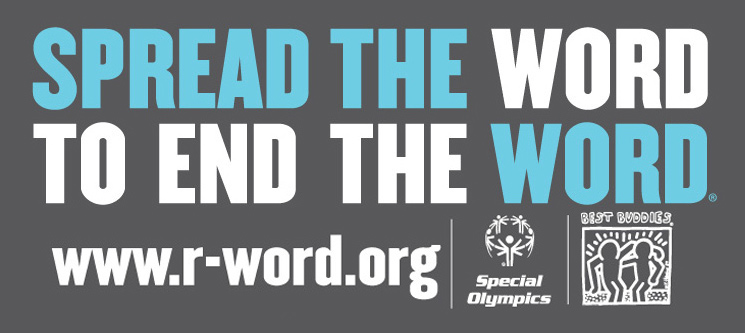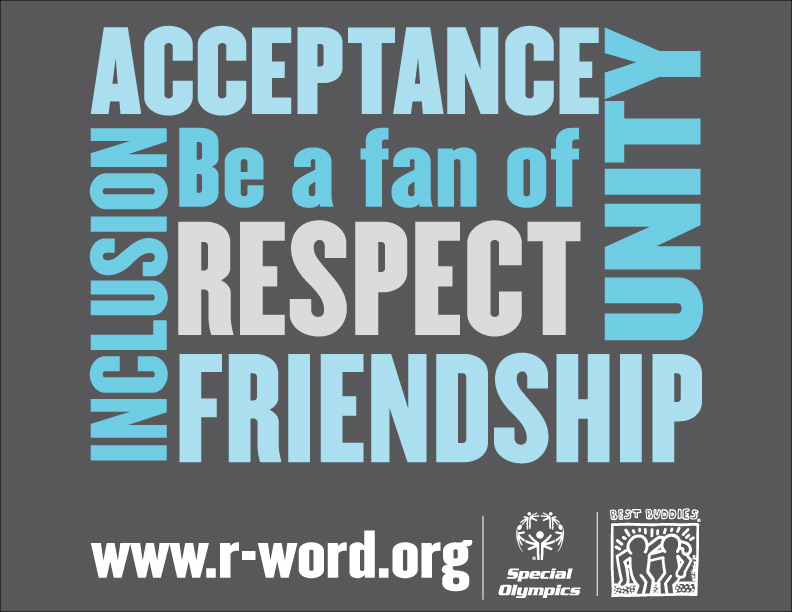With the release of the somewhat controversial movie "Bully", it makes me realize the importance of the "R-Word campaign.
From the End the R-word Campaign.

The effects of the R-word on people with ID and their families and friends
“Everyone has a gift and the world would be better off if we recognized it.” – Timothy Shriver, Chairman and CEO of Special Olympics.
The R-word is the word 'retard(ed)'. Why does it hurt? The R-word hurts because it is exclusive. It’s offensive. It’s derogatory. The R-word is hate speech. See why supporters think the R-Word is hurtful when used in jokes or as part of everyday speech. More on Effects >
How "retardation" went from a clinical description to a word of derision
When they were originally introduced, the terms “mental retardation” or “mentally retarded” were medical terms with a specifically clinical connotation; however, the pejorative forms, “retard” and “retarded” have been used widely in today’s society to degrade and insult people with intellectual disabilities. Additionally, when “retard” and “retarded” are used as synonyms for “dumb” or “stupid” by people without disabilities, it only reinforces painful stereotypes of people with intellectual disabilities being less valued members of humanity.
History of the Campaign
2004
In response to Special Olympics athletes’ call for change, the Special Olympics International Board of Directors adopts a resolution to update the movement’s terminology from "mental retardation" to "intellectual disabilities."
2008
Special Olympics launches the website www.r-word.org to combat the inappropriate use of the R-word in common usage.
August 14, 2008
Special Olympics, Best Buddies International and a coalition of national disability organizations, mobilizes a grass-roots campaign against "Tropic Thunder," a DreamWorks production. Special Olympics athletes joined protestors at demonstrations in Los Angeles, California, Washington D.C., New York City, Delaware, Massachusetts, Missouri and Texas. "Tropic Thunder," marketed as a satire about Hollywood actors and the movie industry in general, contains scenes promoting the idea that a "retard" is funny.
View the complete history of the campaignWhy "intellectual disability" is replacing "mental retardation"
The R-word, “retard,” is slang for the term mental retardation. Mental retardation was what doctors, psychologists, and other professionals used to describe people with significant intellectual impairment. Today the r-word has become a common word used by society as an insult for someone or something stupid. For example, you might hear someone say, “That is so retarded” or “Don’t be such a retard.” When used in this way, the r-word can apply to anyone or anything, and is not specific to someone with a disability. But, even when the r-word is not said to harm someone with a disability, it is hurtful.
Because of this, Special Olympics, Best Buddies and the greater disability community prefers to focus on people and their gifts and accomplishments, and to dispel negative attitudes and stereotypes. As language has evolved, Special Olympics and Best Buddies have updated their official terminology to use standard, people-first language that is more acceptable to constituents.
Rosa’s Law and Legislature Challenges
On October 5, 2010, U.S. President Barack Obama officially signed bill S. 2781 into federal law. Rosa’s Law, which takes its name and inspiration for 9-year-old Rosa Marcellino, removes the terms “mental retardation” and "mentally retarded" from federal health, education and labor policy and replaces them with people first language “individual with an intellectual disability” and “intellectual disability.” The signing of Rosa’s Law is a significant milestone in establishing dignity, inclusion and respect for all people with intellectual disabilities
More on Rosa's Law >
More on Rosa's Law >
WHY THE R-WORD HURTS
Advocates explain why the R-word is so hurtful when used in jokes or as part of everyday speech.
The R-word is EXCLUSIVE“What’s wrong with "retard"? I can only tell you what it means to me and people like me when we hear it. It means that the rest of you are excluding us from your group. We are something that is not like you and something that none of you would ever want to be. We are something outside the "in" group. We are someone that is not your kind. I want you to know that it hurts to be left out here, alone.” – Joseph Franklin Stephens, Special Olympics Virginia athlete and Global Messenger
The R-word IGNORES INDIVIDUALITY“Words matter. People don't need to scoff at others to make a point. Everyone has a gift and the world would be better off if we recognized it.” – Tim Shriver, CEO of Special Olympics
The R-word equates intellectual disability with being DUMB OR STUPIDWhen saying the R-word, “What we mean is that he is as stupid as someone who is mentally handicapped, and we mean that in the most derogatory sense. The implication is that the only characteristic of mentally handicapped individuals is their stupidity.” – Crystal, Stanford, CA
The R-word spreads HURT“It is wrong to pain people with your language. Especially, when you have already been made aware of your oral transgression's impact. Make no mistake about it: WORDS DO HURT! And when you pepper your speak with "retard" and "retarded," you are spreading hurt.” – John C. McGinley, actor and star of the hit TV show “Scrubs”
The R-word is OFFENSIVE“The word retard is considered hate speech because it offends people with intellectual and developmental disabilities as well as the people that care for and support them. It alienates and excludes them. It also emphasizes the negative stereotypes surrounding people with intellectual and developmental disabilities; the common belief that people with intellectual and developmental disabilities should be segregated, hidden away from society, which, in my opinion, is really old fashioned.” – Karleigh Jones, Special Olympics New Zealand athlete
The R-word is INCORRECT“When you say the "R" word it makes people feel bad and it hurts my feelings and I don't want to hear you guys say it. Instead, you can call me a leader, a hero, or a human being, but please don't call me the "R" word.” – Dony Knight, Special Olympics Oregon athlete
The R-word is DEROGATORY“Because the word has become a casual description of anything negative or flawed, ‘retarded’ is no longer considered an appropriate way to describe people with intellectual disabilities. And any use of the word, even when used as slang and not intended to be offensive, is hurtful - because it will always be associated with people who have disabilities.” – Sara Mitton, Board Member, Treasure Valley Down Syndrome Association
The R-word fosters LONELINESS“It hurts and scares me when I am the only person with intellectual disabilities on the bus and young people start making “retard” jokes or references. Please put yourself on that bus and fill the bus with people who are different from you. Imagine that they start making jokes using a term that describes you. It hurts and it is scary.” – Joseph Franklin Stephens, Special Olympics Virginia athlete and Global Messenger
The R-word is HATE SPEECH“I don’t think you understand how much you hurt others when you hate. And maybe you don’t realize that you hate. But that’s what it is; your pre-emptive dismissal of them [people with intellectual disabilities], your dehumanization of them, your mockery of them, it’s nothing but another form of hate. It’s more hateful than racism, more hateful than sexism, more hateful than anything.” – Soeren Palumbo, student, advocate, brother to a sister with an intellectual disability.

Be gentle.
No comments:
Post a Comment
Love reading your thoughts. Please leave us a comment.